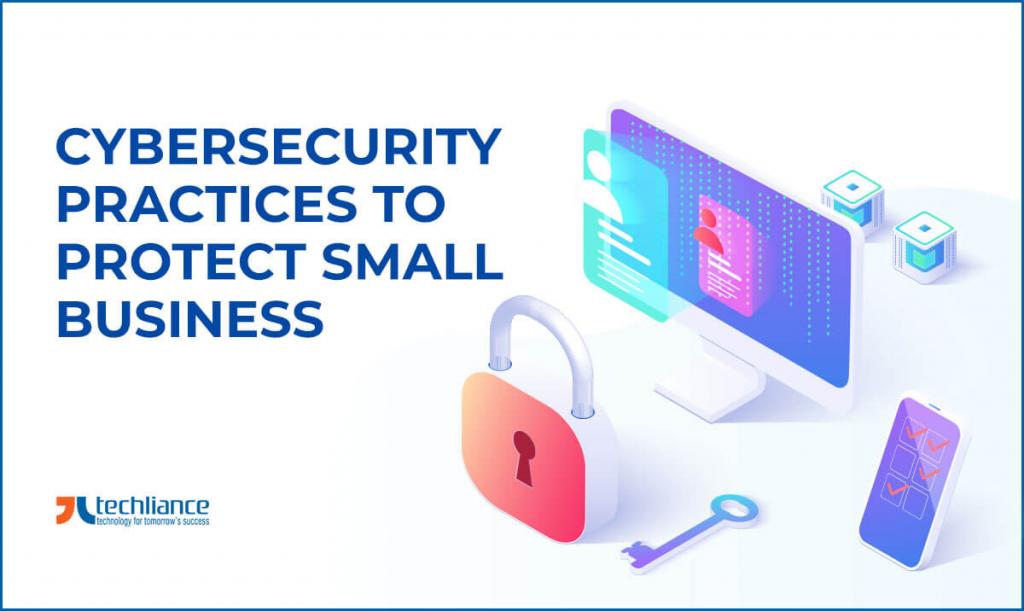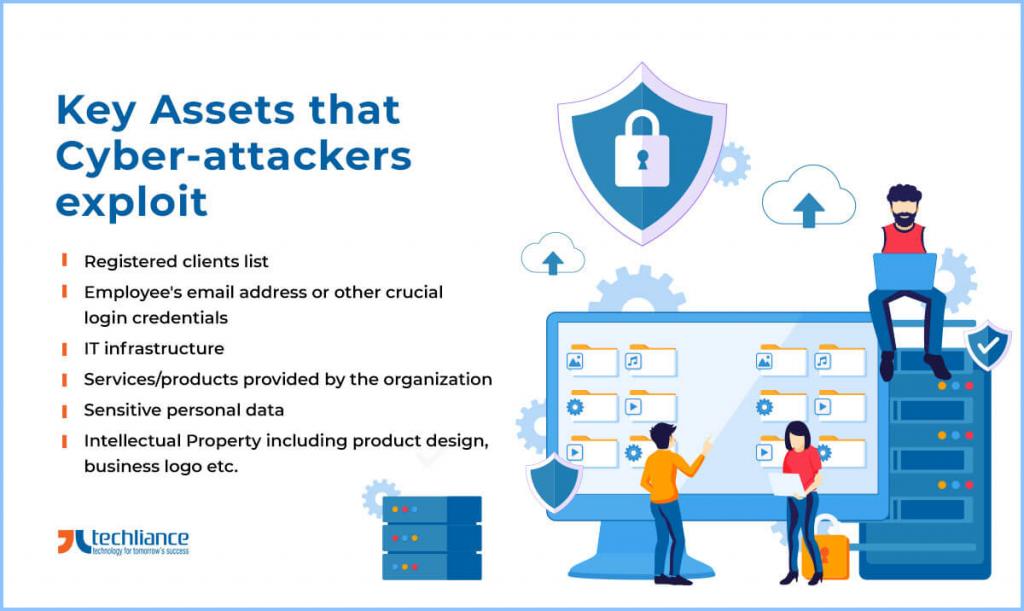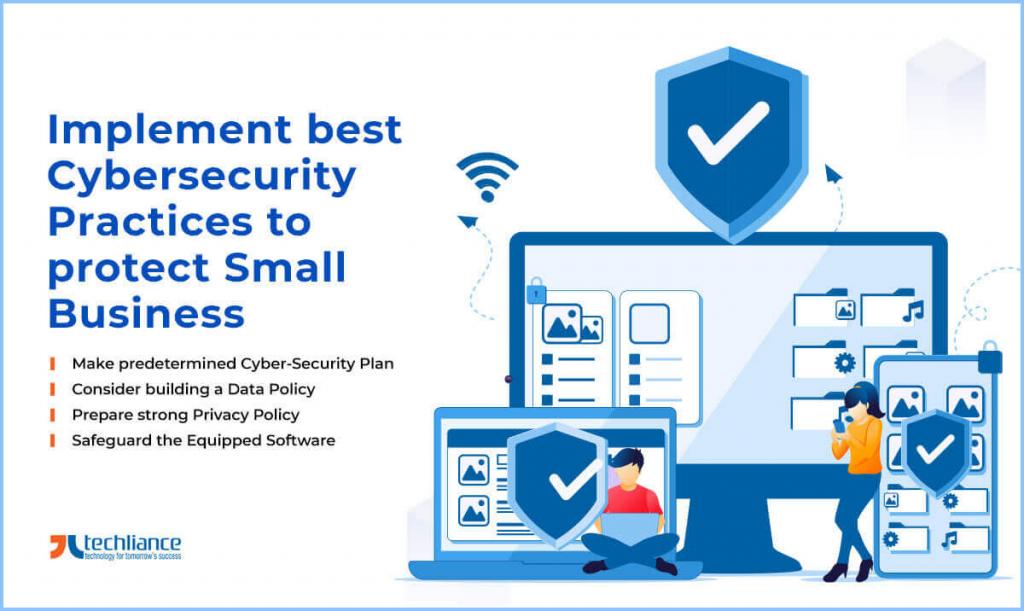Are you the owner of a small-scale enterprise? Is the overall security of your organization strong enough to deal with the critical potential data threat scenarios? If not, then it’s high time that you should start implementing the right cybersecurity protocols to minimize risk. Nowadays, it is necessary to apply cybersecurity practices to protect small business during 2024 from information theft.
Particularly, it is highly suggested providing prior attention to network security. Because cybercriminals can avail easy access to all your stored essential data when the enterprise network is not secured. Primarily, the small enterprises deploy menial cybersecurity protocols, and they lack adequate proactive security policies as well.
As a result, the hackers gain the chance to crack the relative information with ease. They can extract customer’s financial information, steal employee details, and even the deep-rooted trade secrets. Eventually, with less security protection, the small companies become easy-target for the online hackers.
This is the prime reason why larger corporations get less exposure to any sort of cyber-attack compared to small businesses. Additionally, the small business owners technically don’t invest in data security or overall safety of the employees. This puts company owners, and employees in high risk amid 2024 and future years.
Cyber-security does not necessarily need a huge amount of investments. Instead, it can be performed within an affordable budget. So, if you are into small business activities, find out what sort of cybersecurity practices are required to stay equipped.
Consulting an experienced DevOps & IT support company can safeguard your startups, small businesses and established enterprises from data breaches. Execution of cybersecurity practices to protect small business will keep you safe now and for years to come.

What are Cyber Attacks and why they take place?
Mainly, cyber-attacks are an illegitimate attempt to access, wreck down, and even the massive closure of the enterprise data. Well, we all know what actually cyberattacks indicate. But why such uncanny incidents take place, most of us are still unaware of that.
Even worse scenarios may crop up, where they can skillfully surpass the essential credentials. And, when it comes to cyber-security of the small and unauthorized companies, you should always avoid using shortcuts. Every business regardless of its generated revenue or quality of products can be a potential target for cybercrimes.
Before getting hold of required cybersecurity practices to protect small business, it’s crucial to acknowledge common reasons behind potential cyber-attack. So, here is the extensive list of key assets that cyber-attackers vastly exploit across the world.
- Registered clients list
- Employee’s email address or other crucial login credentials
- IT infrastructure
- Services / products provided by the organization
- Sensitive personal data

Moreover, financial gain is the prime motivating factor behind most of the cyberattacks against small businesses. However, there are other factors including establishing a valid social / political point, and espionage. Even intellectual challenges tend to point towards cybersecurity threats.
Why do Entrepreneurs need Cybersecurity Practices to protect Small Business?
Hold on! Do you know that cyber vulnerability can come out of nowhere and that too because of your own employees? Are you getting astonished knowing this fact? Well, you should be.
Because, if there is a chance of cyber threats in your organization, from any outsiders. The chances are also high that company insiders can perform data compromises as well. So, you need to stay watchful on all fronts in 2024.
Eventually, you may face severe commercial losses and it can highly expose certain factors including the following.
- Regulatory action or negligence about the business security
- Inability to mitigate long-term contractual obligations
- Lack of trust between customers and suppliers
Additionally, business websites without SSL certificates are prone to cyber-attacks. So, simply, get in touch with the internet security technicians and safeguard the website for further business enhancement. Don’t let the outsiders / insiders of your company disrupt and damage the prolonged business activities.
Implement best Cybersecurity Practices to protect Small Business
These are the essential cybersecurity techniques that can minimize the data breaching threat effectively.
- Make predetermined Cyber-Security Plan
- Consider building a Data Policy
- Prepare strong Privacy Policy
- Safeguard the Equipped Software

Now, let’s move into the nitty gritty of these cybersecurity procedures.
Make predetermined Cyber-Security Plan
Inadequate cyber-security plans can dramatically impact entrepreneurship. So, don’t lose any chance to intensify it to prevent the business from cyber-criminals. Though, the advent of technology has opened up immersive benefits but poses challenges to entrepreneurs as well.
Latest survey by Microsoft sees 73% of CISOs disclosing that their companies have faced sensitive data breaches in last year. Basic cyber-security plan must include a wide range of security measures and best technical practices. And, some of the prime inclusions contain extensive security deployments such as two-factor authentication, strong passwords, and rigorous network-monitoring mechanisms.
Alongside this, you should always consider deploying top-rated antivirus and anti-malware software, firewalls, and even a list of whitelisted apps. It also cooperates with a security incident response plan, if any cyberattack scenarios take place. However, an effective cybersecurity plan does not necessarily imply how you have designed the security deployment. But it all relies on the pattern of the approach.
So, when it comes to building the cyber-security policy, provide your prior attention towards the nature of the human fallacy. Similarly, take into account other essential co-opt prerequisites, that can unknowingly interrupt the business operations. Thus, we would highly recommend taking these aspects into account- both the digital and physical threats.
Consider building a Data Policy
A proactive data policy plays an integral role in small-scale companies in the United States and globally. Because, every enterprise, irrespective of its size mainly deals with a wide range of essential data. Practically, it gets extensively transformed from a large number of clients to the business holders.
In general, all businesses consist of the same sort of data types. Ranging from financial data to customer data to employee records — everything seems common. So, due to sudden cyberattacks, the highly confidential data can be even widely traced with the expertise of the cybercriminals.
As an entrepreneur, it’s your responsibility to implement a data policy to safeguard the performance evaluations related to data. This includes the internal audit reports, and even the preplanned marketing plan. A good chunk of data can be easily accessed by hackers once they get into your public network.
A report by Hiscox reveals that 73% of small businesses have not yet implemented any sort of formal cybersecurity plan. So, avail the professional assistance of the internet security specialists to move essential / sensitive personal data in safe locations. Also, don’t forget to implement stringent access control, information encryption, and other required data safety measures.
Prepare strong Privacy Policy
Along with the cyber-security plan and data policy, a privacy policy also needs to be included in your business plan. Technically, a privacy policy outlines what generally the business owners or his associate’s practice, the information that they gather. Foremost, after devising the business policy, you should make a pledge to the customers about information security. So, assure them that no cyber-criminals can invade their privacy through your website or mobile app.
Likewise, this is the prime reason why the authorized companies gain the preference of the clients. Because they contain a well-designed privacy policy that is free from any potential data threat. So, the IT sectors should recognize the importance of the below-mentioned factors and must act accordingly going forward.
- Personally, identifiable information including the client/employee’s name, addresses, credit card details, bank account number, and even taxpayer identification number
- Additionally, you should secure the contact details, purchasing history, employee payroll records, and other essential information
- Furthermore, if you operate a small-scale healthy organization, protect personal health information
Now, it’s time to find out what are the other aspects that need prompt action to lower the vulnerability level.
Safeguard the Equipped Software
The deep-rooted software is the prime source of success for a wide range of small enterprises. Mainly, this software is the epicentre of IT infrastructure, one which the companies operate through. And, in most circumstances, the cyberattacks are primarily caused due to the lack of formal policy implanted in this software.
The vulnerability of getting hacked is relatively high owing to the installed application. And, once they break into the system, they can easily access the other connected systems, as well. So, start investing in code development amidst 2024.
It is critically important to opt for a software update to improve its security. Alongside don’t forget to regularly check the system updates. So, make sure that the installed programs have the latest versions.
Secure the Enterprise Network Now
Always remember, a well-planned cybersecurity measure is the prime foundation of an authorized enterprise. You should never withstand the vulnerability that can only negatively impact the enterprise, products and security of the employee. So, now it’s time to opt for the right cyber-security practice to help you prevent massive business losses.
Verify that you have secured the business website and have provided privacy training to every employee. Besides, encrypt the valuable data, and lock the enterprise network with SSL/TLS authorization. Hopefully now you know what needs to be actually done to ensure cybersecurity. Therefore, start focusing on these aspects and make your enterprise free from any sort of vulnerability.




